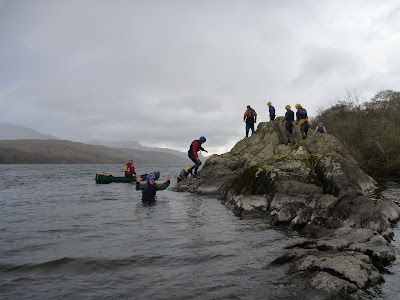 During the first week of April, Iain has been busy - working on behalf of the Cadet Centre for Adventurous Training at their Halton Training Centre near Lancaster.
During the first week of April, Iain has been busy - working on behalf of the Cadet Centre for Adventurous Training at their Halton Training Centre near Lancaster.Five cadets from the Sheffield ACF were joined by a cadet instructor from Workington to attend this course known as the Open Canoe Foundation Course (O2F).
As the term foundation course suggests - this is intended to provide cadets with the basic knowledge required to start paddling open canoes (Canadian Canoes) on their own or as a pair. Photo one shows the group on day two of their Open Canoe foundation course on Coniston Water - paddling in tandem (as pairs).

Shortly after photo one was taken, we had lunch on Peel Island (Wildcat Island if you have ever read Arthur Ransomes book "Swallows & Amazons"). We had, by this point, been joined by Infantry Training recruits also staying at Halton TC.
As can be seen in photo two, the difference between what cadets & ITC recruits get up to can be fairly radical. Unlike the ITC Recruits in this photo Iain had no intention of asking his charges to jump into the freezing water today and it was cold - this was the start of that cold spell last week when winter returned to the North & East of the UK with a vengeance for 48 hours and the forecast northerly wind hit us fairly shortly after this photograph was taken.
 After two days of skills training in which Iain taught his cadets everything he could think of to do with Canadian Canoes, it was time to go on our expedition.
After two days of skills training in which Iain taught his cadets everything he could think of to do with Canadian Canoes, it was time to go on our expedition.As part of every Open Canoe Foundation Course it is expected that candidates will undertake at two day jounrney involving an overnight camp. Our expedition involved paddling 20 kilometres along the Lancaster Canal starting in Lancaster & finishing south of Garstang.
Owing to the inclement wintry weather in The Lake District, it was deemed that this would be a more appropriate challenge for the group; and a challenge it certainly was!

Canadian Canoes are large craft. A small on is typically 13 feet long and the largest are up to 17 feet long. These days they are made out of plastic laminates such as Royalex or cross-linked Polyethylene to give then a low weight. However owing to the fact that they sit high in the water they are easily affected by wind. During our journey down the Lancaster Canal, we were constantly being blown sideways by the strong N Easterly wind that blew all day.
The cadets were expected to paddle their boats solo ie on their own, so by the end of 12km Iain had a tired group on his hands; and it wasn't until 8pm that we erected camp at a convenient campsite on the side of the canal.
Apart from the wind, we didn't encounter many other hazards on the canal apart from Canal barges such as the one seen in photo four. These are slow moving longboats with luxuriously decorated interiors as they are very often floating homes for people undertaking canal cruises. What a mellow way to get around!
 Photo Five shows Rachel in the front of Iains boat with Jerome still paddling solo towards the end of day one of the exped.
Photo Five shows Rachel in the front of Iains boat with Jerome still paddling solo towards the end of day one of the exped.As can be seen, Canadian Canoes are fantastic craft to use when undertaking a water based expedition
as they have loads of room on board for stowing equipment such as dry tubs (the blue drum) and dry bags - essential to keep clothing, food & camping equipment dry. The Canadian Indians used to travel for days in them and they are ideal for a multi-day journey such as a river trip.
Kendal Mountaineering Services offer introductory half day Canadian Canoeing and Kayaking half & full day sessions in the Lake District. Prices start at just £45 per person for a half day session of £70 for a full 8 hour day with Lunch for an additional £6 per person. Canadian Canoeing is great as part of a fun family day out or part of a Stag or Hen Event. Prices quoted are for a minimum of two people. Contact us to book your session on one of the areas lakes or rivers - you won't be disappointed!

No comments:
Post a Comment